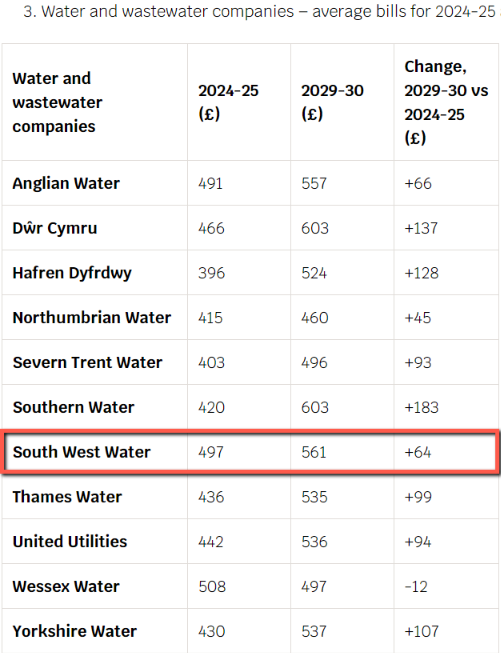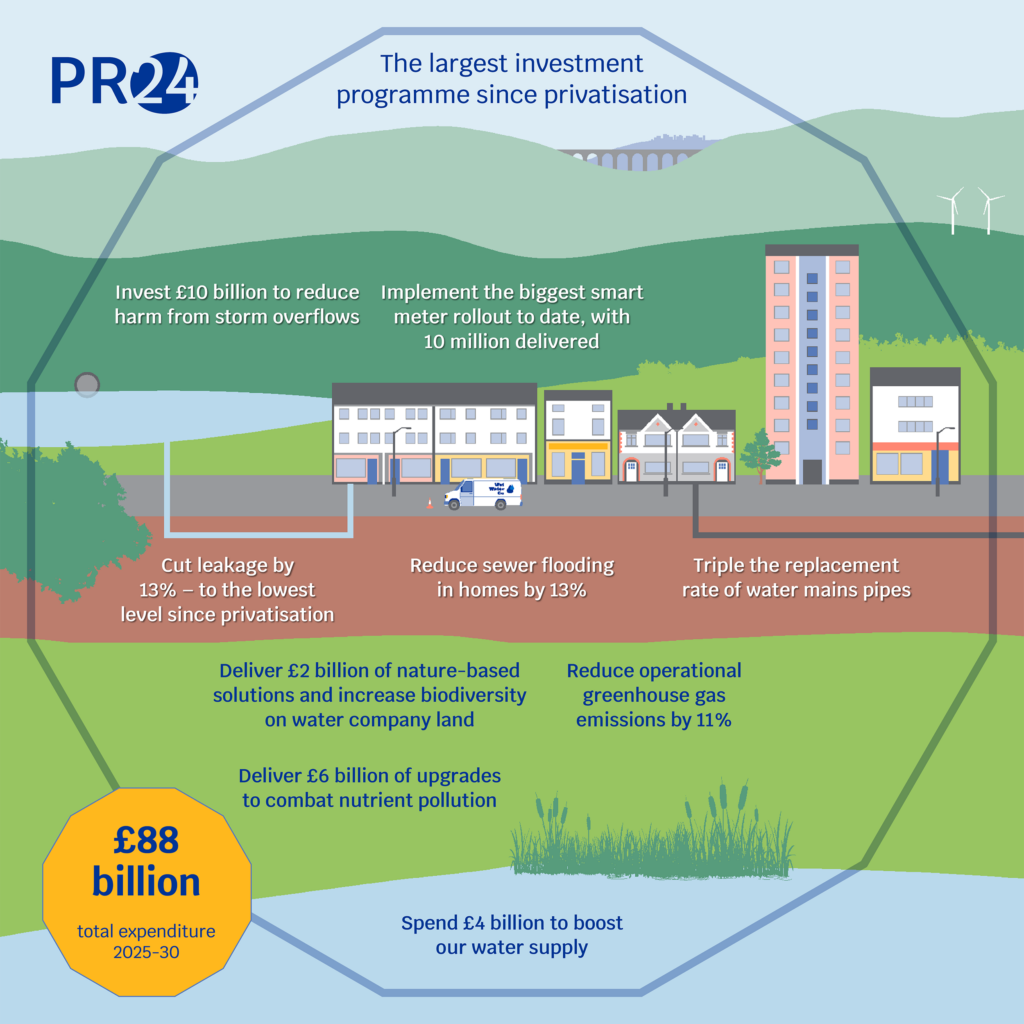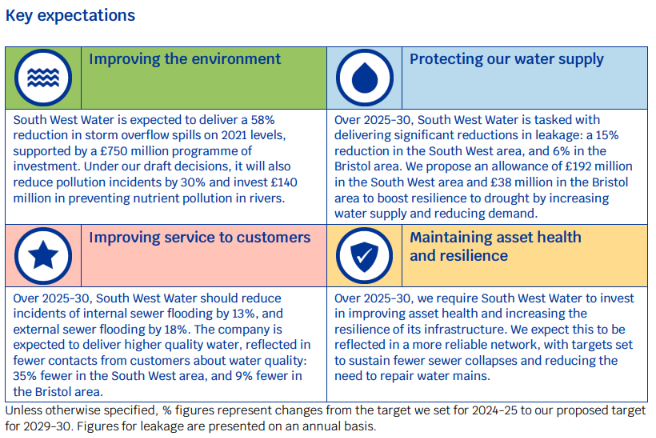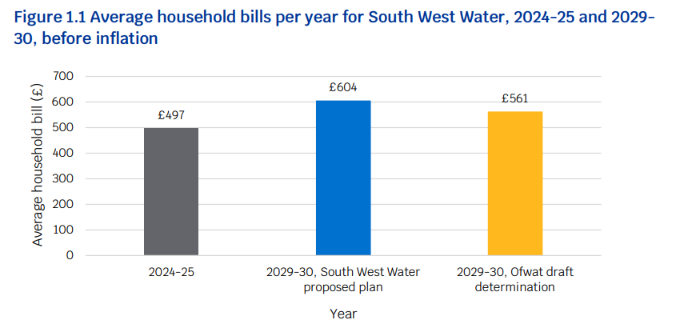In a press release this morning Ofwat announced the findings of their draft price review for 2025-29:
Ofwat has today proposed allowing a spending package of £88bn by water companies.
£35bn of the expenditure reflects the investment needed to reduce pollution, improve customer service, river and bathing water quality, and deliver greater resilience to the impact of climate change. This is more than a trebling of the level of investment in the 2020 to 2025 period.
The total expenditure proposed is £16bn lower than in companies’ business plans. This reflects Ofwat’s analysis of those plans, removing or reducing costs where expenditure is insufficiently justified, inefficient or for activity for which companies have already been funded; customers will not pay twice.
The average bill increase for water and wastewater companies will be £19 a year over five years (£94 in total), excluding inflation. Companies’ business plans proposed increases averaging £144 over five years. Ofwat’s interventions have reduced the level of bill increases proposed by companies. For example, Thames Water’s proposed increase of £191 by 2030 has been reduced to £99; Severn Trent’s proposed increase of £144 has been reduced to £93.
The notes at the end of the press release reveal that Ofwat are proposing that South West Water increase average bills by £64 per annum by 2030:

Ofwat also provide an overview of their “draft determinations”:
At PR24, the water sector must deliver substantial change.
In our draft determinations, we’re setting out the biggest ever investment package to protect our rivers and seas, build new reservoirs, reduce leaks and raise the bar on company performance.
These draft determinations set the sector on the path towards long-term transformation, which will deliver better outcomes for customers and the environment.
Water companies in England and Wales submitted their business plans to us in October 2023, based on the methodology we set out in 2022.
We are consulting on our draft decisions and welcome responses before 12 noon on 28 August 2024. You can respond to our consultation here.
We expect to publish our final decisions on 19 December 2024. We have also published a consultation on a proposed modification to companies’ licences. This would allow Ofwat to delay final determinations until January 2025 if necessary.

Amongst the numerous appendices are a set of company specific documents for South West Water. The overview document reveals that Ofwat expects SWW to “deliver a 58% reduction in storm overflow spills on 2021 levels” amongst other things:

and that SWW suggested an average bill increase of £107 per annum would be required to achieve those goals:

The assorted Ofwat documents make no mention of any additional reservoirs in Devon and Cornwall, but there is mention of some joint projects with Wessex Water:
All three projects are being jointly developed with Wessex Water, and will start construction in the 2030-35 period:
- Cheddar 2 Source and Transfer: This will see a second reservoir constructed at Cheddar, filled from Cheddar springs and the River Axe. We allow £41 million to develop this option in 2025-30, with total scheme costs of £839 million.
- Mendip Quarries: This is a new reservoir built by repurposing a quarry located in the Mendips Hills. We allow £22 million to develop this option in 2025-30, with total scheme costs of £1.7 billion.
- Poole Effluent Recycling and Transfers: This will use circular economy principles to recycle wastewater from a Wessex Water treatment works, via a wetland and the River Stour, to supply South West Water customers with potable water. We allow £17 million to develop this option in 2025-30, with total scheme costs of £306 million.
Needless to say a variety of campaigners are not entirely happy with Ofwat’s proposals. Surfers Against Sewage had this to say on X (formerly Twitter):
According to Sky News yesterday:
The new environment secretary has summoned the bosses of most of Britain’s water companies for urgent talks amid signs that Labour will take a tougher approach to regulating the industry.
Sky News has learnt that Steve Reed will hold talks with executives from all 16 of the suppliers in England and Wales, including Thames Water, Yorkshire Water and Severn Trent…
In opposition, Mr Reed – now Secretary of State for the Environment, Food and Rural Affairs – pledged to push for criminal sanctions against water company executives who failed to prevent sewage contaminating Britain’s waterways.
A source close to Mr Reed said: “The last Conservative government weakened regulation allowing the sewage system to crumble and illegal sewage dumping to hit record levels.
“The election of this Labour government is a reset moment for the water industry.”
In another press release this morning His Majesty’s new Government announced that:
[Update – July 11th 13:40]Secretary of State for Environment Food and Rural Affairs Steve Reed has today (11 July 2024) announced a series of initial steps towards ending the crisis in the water sector.
As Ofwat publishes its draft responses on water company spending, the new measures represent a step change after years of failure to ensure the water industry cuts illegal sewage dumping and attracts major private-sector investment to upgrade infrastructure while prioritising the interests of customers and the environment.
This afternoon the Secretary of State will also meet with water company Chief Executives to make clear that under this government water companies will be answerable for their performance for customers and the environment. He will set out his plans to work in partnership with the sector and investors to attract investment, jobs, and clean up the nation’s polluted waterways.
He has today announced:
- He has written to Ofwat to ask them to make sure funding for vital infrastructure investment is ringfenced and can only be spent on upgrades benefiting customers and the environment. He also wants Ofwat to ensure that when money for investment is not spent, companies refund customers, with money never allowed to be diverted for bonuses, dividends or salary increases.
- Water companies will place customers and the environment at the heart of their objectives. The Secretary of State is clear that he expects companies to change their ‘Articles of Association’ – the rules governing each company – to make the interests of customers and the environment a primary objective.
- Consumers will gain new powers to hold water company bosses to account through powerful new customer panels. For the first time in history, customers will have the power to summon board members and hold water executives to account.
- Strengthened protection and compensation for households and businesses when their basic water services are affected. Subject to consultation, the amount of compensation customers are legally entitled to when key standards are not met will more than double. The payments will also be triggered by a wider set of circumstances including Boil Water Notices.
Secretary of State for Environment, Food and Rural Affairs, Steve Reed said:
“We will never look the other way while water companies pump sewage into our rivers, lakes and seas.
This unacceptable destruction of our waterways should never have been allowed, but change has now begun so it can never happen again.
Today I have announced significant steps to clean up the water industry to cut sewage pollution, protect customers and attract investment to upgrade its crumbling infrastructure.
That change will take time. Over the coming weeks and months, this Government will outline further steps to reform the water sector and restore our rivers, lakes and seas to good health.
These steps sit alongside the Government’s manifesto commitments to put failing water companies under tough special measures to clean up our waterways.”
Defra Xweets:
The Labour Party explains how the new Government will fix our broken water system:
What do you think?
To be continued…